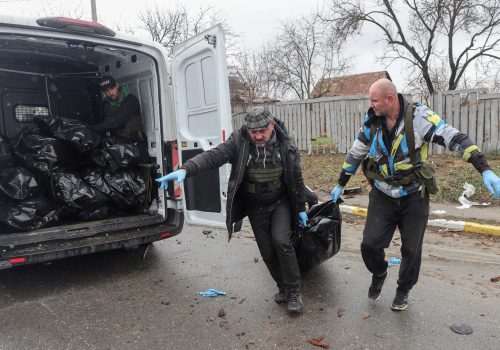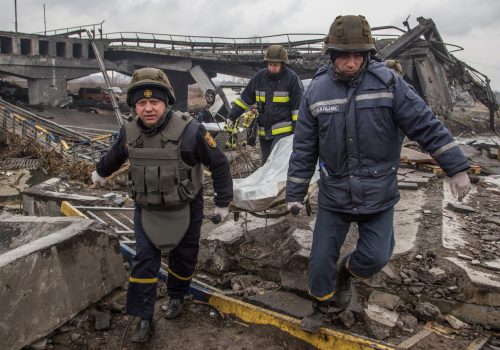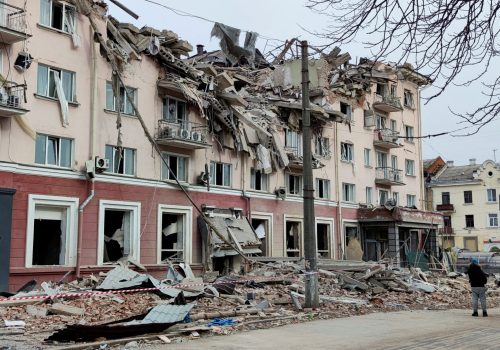FAST THINKING: How will the West punish Russia for its war crimes?
GET UP TO SPEED
Gruesome images of murdered Ukrainian civilians—evidence of apparent Russian war crimes uncovered in Bucha and other newly liberated towns outside of Kyiv—have shocked the world. Nearly six weeks into Russian President Vladimir Putin’s war on Ukraine, Western countries are facing new pressure to act. But how? Our experts explain what this dark development means for the war, as well as how the United States and its allies and partners should respond.
TODAY’S EXPERT REACTION COURTESY OF
- Gissou Nia (@GissouNia): Director of the Strategic Litigation Project and human-rights lawyer
- Daniel Fried (@AmbDanFried): Weiser family distinguished fellow and former US ambassador to Poland
Deadly truths
- Following weeks of reports of indiscriminate Russian shelling of non-military targets, Gissou tells us this past weekend’s revelations represent “the most damning evidence yet” that Russia is systematically targeting civilians and thus committing war crimes.
- Rather than an aberration, these killings—along with the brutal bombardment of Ukrainian cities and recent accounts of rape, looting, and the mass deportations of Ukrainians from occupied territories to Russia—offer a chilling reflection of the Kremlin’s thinking, Dan adds: “To Putin, Ukraine does not exist as a nation except in alignment with and subordination to Russia.” That, he says, means only one thing: “Ukrainians are fighting for their national and physical survival.”
- We’ve seen this before, Dan notes. Putin’s attitude toward Ukraine—which he says “combines Stalinist and reactionary tsarist thinking”—has informed Russian military methods that “recall those used by the Soviet security services against the Baltics, Poland, and other countries in Eastern Europe” under Moscow’s yoke in the twentieth century.
Scene of the crime
- When it comes to punishing perpetrators of the atrocities in places like Bucha, Gissou points to a silver lining: “In contrast to conflicts in Syria, Ethiopia, or Myanmar… war-crimes investigators looking into accountability in Ukraine will have the benefit of access.”
- That means they’ll be able to collect more evidence, and quicker, than is typically possible in other conflicts, where “government-aligned perpetrators often prevent independent investigators from accessing crime scenes,” she says. But investigators—whether from the International Criminal Court or Ukraine’s own law-enforcement agencies—will still need substantial financial and technical support to swiftly collect and preserve evidence.
Taking killers to task
- For now, Dan believes, much depends on “increasing Ukraine’s staying power and decreasing Russia’s.” That means stepping up US and European weapons shipments to Kyiv and sanctions against Russia—and accepting a crucial fact: “It should be Ukraine’s call when to keep up the fight and when to settle [with Russia] and on what terms.”
- And even if Kyiv chooses a settlement, Dan adds, the West should refrain from pushing it to accept any deal that cedes territorial gains to the Kremlin for the sake of quick peace. “We now know what the Russians may do to the people in territories they control.”
- The United States can also assist in other ways, Gissou says: In addition to helping authorities gather evidence of Russian war crimes, US lawmakers should pass legislation allowing US prosecutors more leeway than they currently have to go after Russian war criminals.
- Congress, for example, could “pass a crimes against humanity statute to criminalize widespread or systematic attacks on civilian populations,” Gissou explains, and an amendment to the federal war-crimes statute to allow for jurisdiction over perpetrators of atrocities like those in Bucha who enter the United States. Simply put, she tells us, Washington needs to “strengthen its own atrocity-accountability toolkit.”
Further reading
Sun, Apr 3, 2022
The West must choose: Either arm Ukraine or enable Putin’s genocide
UkraineAlert By Peter Dickinson
Revelations of Russian war crimes outside Kyiv underscore the urgency of providing the Ukrainian military more weapons.
Fri, Apr 1, 2022
In Ukraine, I’ve seen the impossible become possible. The West hasn’t grasped that yet.
New Atlanticist By Dan Peleschuk
Atlantic Council editor Dan Peleschuk reflects on what it's like watching stark realities unfold—and why policymakers should act now.
Wed, Mar 16, 2022
Punish Putin for past and present crimes
New Atlanticist By Gissou Nia, Jomana Qaddour
Justice will remain incomplete if the dots aren't connected among Putin’s crimes in Chechnya, Syria, and Ukraine.
Image: Ukraine's President Volodymyr Zelenskyy looks on as he stands with Ukrainian servicemen, amid Russia's invasion of Ukraine, in Bucha, outside Kyiv, Ukraine, on April 4, 2022. Photo via REUTERS/Marko Djurica.


